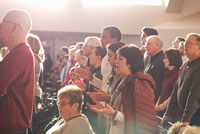Day 332, Chronological Bible Study Timeline. Map. Go to today’s Bible reading (use your browser arrow to return): 1Corinthians 11:2–14:40
Proper Worship
What should be acceptable behavior in a worship service? Are all forms and actions appropriate? How do we worship the LORD in a way that is pleasing to him?
The church in Corinth (an ancient city in Turkey) had many problems and questions. One of the challenges they had was that their worship times were embarrassingly out of control. In today’s Bible reading, Paul addresses this issue to correct it. The instructions he gives to them are also profitable for us.
Who Should Lead in Worship?
The Apostle Paul says the followers of Christ are to maintain an attitude of submission toward each other and the LORD. However, he states that there is a proper order to follow: “Now I want you to realize that the head of every man is Christ, and the head of the woman is man, and the head of Christ is God” (1Corinthians 11:3, NIV). Each man and woman should follow his or her head and be submissive. This statement was significant for Corinth because her culture was full of immorality and idol worship. Proper order and respect needed to be restored.
Applying the principle of headship or authority in a worship service, we might say that the congregation should follow the lead of the worship leader, the worship leader the direction of the pastor or minister, and the pastor or minister should follow the Lord.
Pride and Division
One person, regardless of his position or influence, is not better than another. In a Communion Service where bread and wine (or unfermented wine, i.e., grape juice) are served, believers in Christ are to remember the body and blood of Jesus Christ. It’s not a time for some believers to put themselves above others with their own sense of self-importance. Position and material wealth or the lack thereof don’t matter in Christ. What matters is that we gather together to remember the Lord in a spirit of love and unity. If a communion service becomes a bickering service, or we willfully allow ourselves to be otherwise distracted, we are in danger of being severely judged for not giving proper attention and reverence for the Lord’s body, which was sacrificed for us (1Corinthians 11:27-32).
Spiritual Gifts in Worship
The Apostle Paul said that the Holy Spirit gives spiritual gifts. Each believer in Christ has at least one gift, and it is the Holy Spirit who determines which are given. 1Corinthians 12:8-12 and Romans 12:6-8, and Ephesians 4:7, 11-13 give us lists as to what they were at the time of Paul's writings. These may be examples of gifts given and are not necessarily all-inclusive. Most of the spiritual gifts listed remain with us today, but some Scriptures lead us to believe sign gifts ended of their own accord after the Bible was complete (1Corinthians 13:8-10; Hebrews 1:1-2; 2:3-4).Spiritual gifts are to be used for the common good (1Corinthians 12:7) to benefit the whole body of Christ. “The body is a unit, though it is made up of many parts; and though all its parts are many, they form one body. So it is with Christ” (1Corinthians 12:12, NIV). Instead of being self-absorbed with our own spiritual gifts or being jealous of someone else’s, we need to be servants with what God has given us. We should appreciate the contributions of all members of the body of Christ. We need each other!
Exercising Spiritual Gifts
Spiritual gifts are to be exercised in love and in consideration of one another. 1Corinthian 13 is the great love chapter often quoted in wedding ceremonies. The context of it informs us how to exercise our spiritual gifts. We must not draw attention to ourselves but honor and respect each other and put their needs before ours.
In worship services, we must exercise self-control and prefer the more extraordinary gift of prophecy, i.e., the proclamation of God’s Word, the Bible. All spiritual gifts are given for the building up of the body of Christ, not to draw distinctions between those who are spiritual and those who are not. The gifts are “for the strengthening of the church” (1Corinthians14:26, NIV).
We must be considerate of each other and wait for the opportune time to exercise them. “God is not a God of disorder but of peace” (1Corinthians 14:33, NIV). “Everything should be done in a fitting and orderly way” (1Corinthians 14:40, NIV). This is another way of saying our worship should be done with propriety.
Discussion
How do we apply the principle of headship in our homes and churches?
Why is it important to discern the Lord’s body in a communion service, and what does that mean?
How should we exercise our spiritual gifts?
Focus Verse
1Corinthians 14:40 (NIV): “But everything should be done in a fitting and orderly way.”
Write a private prayer response to today’s Bible study:
Please send your comments to mtbiblestudies@gmail.com
Looking Ahead: Yet another question the Corinthians had was about The Resurrection and its Importance. Find out more in our Next Lesson.
Back to top of page
Return to Chronological Bible Studies main page
Go to Scriptures main page
Go to Topics main page
Go to Home pagere-edited 11-27-2020
COPYRIGHT @ 2019, MASTER'S TOUCH BIBLE STUDIES

